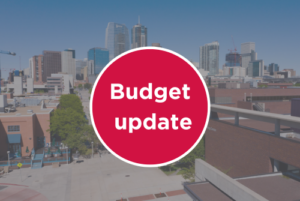 Faculty and staff members at Metropolitan State University of Denver would receive across-the-board pay raises and the University would continue to invest in student-retention efforts under a budget recommendation from the newly formed University Planning and Budget Advisory Council.
Faculty and staff members at Metropolitan State University of Denver would receive across-the-board pay raises and the University would continue to invest in student-retention efforts under a budget recommendation from the newly formed University Planning and Budget Advisory Council.
In its recommendation submitted last week to President Janine Davidson, Ph.D., the group also endorsed a 5% increase in tuition and student fees for the fiscal year beginning July 1 as well as a plan to allocate to MSU Denver’s reserves any revenue generated by enrollment increases.
The council, comprising representatives from all academic and administrative branches across campus, is at the heart of a new year-round budget-planning process that is taking a more strategic, decentralized and transparent approach to managing the University’s finances.
To support this new process, UBPAC recommended that the University build into its base budget most of the one-time funds that had traditionally been used for ongoing costs. The move would mark a significant budget shift that would allow University leaders to plan more strategically.
University senior leaders established UPBAC, which replaced the former Budget Recommendation Committee, to provide budget advice to Davidson. She will consider the input when making her final budget recommendation to the MSU Denver Board of Trustees at its June 1-2 meetings.
“I appreciate the hard work and thoughtful approach that UPBAC put into this recommendation, and I will consider it carefully as we prepare our budget for the coming year. This is ‘leaders leading’ across the organization,” Davidson said. “Our new budget model will help us more strategically budget for future success in an ever-changing higher–ed landscape. That success starts with our people.”
Pay-raise options
All classified employees will receive a 5% pay increase as approved by the state legislature this year.
For other faculty and professional-staff members, who make up the vast majority of employees at MSU Denver, UPBAC asked Davidson to consider two options for pay raises. One would provide an across-the-board 4% increase beginning July 1. The second option would provide an across-the-board $2,800 raise, also effective July 1. The options cost nearly the same.
Supporters of the first option argue that a flat-percentage increase would help the University be more competitive in hiring and retaining faculty and staff members in high-demand fields. They noted that employees have not received a flat-percentage increase since 2019.
Those who advocated for the $2,800 raise said a flat-dollar increase would support employees on the lower end of the wage scale, providing them with a higher percentage increase than those on the upper end of the pay scale.
While the FY24 budget will not be impacted by immediate faculty workload changes, schools and colleges will be reprioritizing their departmental budgets to begin balancing workloads using personnel-vacancy savings and other efficiencies in a budget-neutral fashion. The Faculty Workload Taskforce will share additional information regarding faculty workload recommendations ahead of next week’s Board of Trustees meetings.
Balanced budget
As it sought to recommend a balanced budget, UPBAC advised a 5% tuition increase, which is in line with increases at other universities in the state. UPBAC members noted that any increase would impact only incoming students. Existing students will continue to pay the same tuition rates that they paid this year, thanks to MSU Denver’s Tuition Lock Guarantee.
Other highlights of the recommendation include funding more than $4 million in mandatory cost increases, such as Auraria Higher Education Center leases and fees; faculty promotions and post-tenure reviews; and institutional financial aid.
UPBAC endorsed nearly $2 million in spending to help support student success, including $1.3 million in funding for the new College of Aerospace, Computing, Engineering and Design. And the recommendation includes continued funding for “LAUNCH!” initiatives such as concurrent enrollment, Pathways to Possible, the Roadrunner Promise and other programs that support student recruitment and retention.
FY24 UPBAC Budget recommendations
Read the full detailed recommendation, posted on the UPBAC SharePoint page.
A new era for budget planning at MSU Denver
Over the past year, MSU Denver has moved toward year-round and long-term financial-planning processes. This approach will allow the University to provide better and more transparent data, identify efficiencies and reallocate resources toward revenue-generation and mission-enhancing efforts. UPBAC met 12 times beginning in January as part of an inclusive and transparent process, hearing budget presentations and requests from all University branches. Members collectively submitted 10 recommendations in alignment with the University’s mission and budget priorities, offering feedback on assumptions, priorities, cost drivers and revenue drivers.
The University has begun shifting from a two-phase budget process, in which non-base budgets were not approved until fall, to a single-phase process with the full budget approved by the Board of Trustees in June. In addition to phasing out “one-time ongoing” spending as recommended by UPBAC, the University will begin developing new reporting and analytical tools supported by Workday.
Annual budget-planning timeline
- Summer: Planning and budget assumptions and trustee/presidential budget priorities are set.
- Fall: Budget owners develop their proposals with input from their stakeholders and submit them to UPBAC.
- January: UPBAC reviews assumptions and provides perspectives for the president’s consideration.
- May/June: The president considers the feedback, then submits proposals to the trustees for approval.
After Davidson presents her final budget proposal to the Board of Trustees next week, details on the outcome of the meeting will be shared with the University community via the Early Bird and the Office of the President and will be posted to relevant webpages and SharePoint pages. In the meantime, you can learn more about UPBAC and find meeting information and documentation on the UPBAC SharePoint page.

